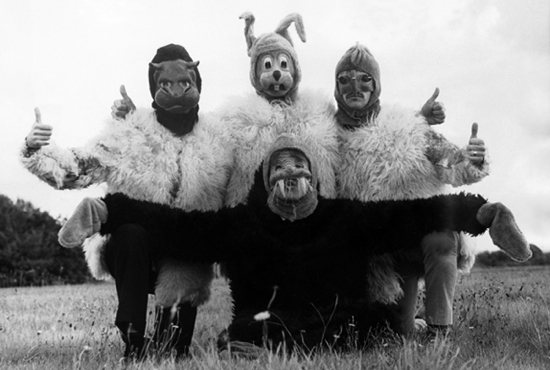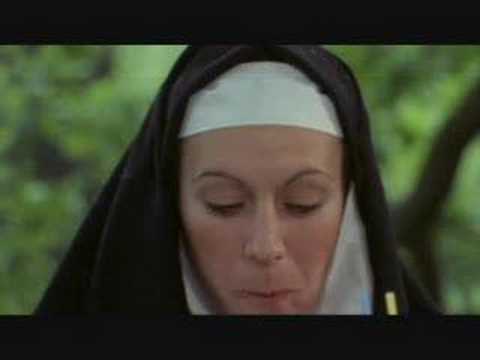On the 27th of December 1967, Paul McCartney put in a hastily arranged appearance on The Frost Programme. This was the day after Magical Mystery Tour had aired on the BBC and the Beatle was in something of a defensive mood. "You can’t say it was a success," McCartney explained, "because the papers didn’t like it. And that seems to be what people read to find out what’s a success." Clearly wounded by the critical mauling his latest effort had received, he nonetheless remained undeterred: "I think it’s as good as I always thought it was." A few days later, presumably once the negative press had settled in, he’d changed tack somewhat. "We don’t say it was a good film," was the response this time. "We’ll know better next time."
There would be a number of next times thanks to the newly-founded Apple Corps. Rather than killing off a film career, Magical Mystery Tour began one. The Beatles’ new company would incorporate many divisions – not just the famous Apple Records, but also Apple Films, Apple Publishing, Apple Electronics, even the short-lived Apple Boutique. The ethos was a selfless one, as McCartney helpfully pointed out during the official press conference: "We’re in the happy position of not really needing any more money. So for the first time, the bosses aren’t in it for profit. If you come and see me and say ‘I’ve had such and such a dream’, I’ll say, ‘Here’s so much money. Go away and do it.’"
Despite the claims, Apple Films pretty much operated ‘in-house’. The dreams making the transition to celluloid weren’t those of the average guy on the street, but rather those of The Beatles themselves. Indeed, next on the slate was another of McCartney’s ideas, the let’s-watch-the-band-record-an-album documentary that would become Let It Be. Unavailable for many years (though rumour has it that it’s next in line for the deluxe DVD and Blu-ray treatment following Magical Mystery Tour), the film nowadays has a tendency to be misremembered. Thanks, perhaps, to The Beatles Anthology and its choice of clips and outtakes, Let It Be has since become the one in which Paul and George bicker, thereby serving as a dramatic insight into the reasons behind the split – which isn’t strictly true. For the most part it’s just a portrait of four musicians in a studio, occasionally taking things seriously, but generally insisting on goofing off and playing up to the cameras. It’s also often forgotten that The Beatles bagged themselves an Oscar for the movie, for Best Original Song Score, though they asked Quincy Jones to collect the Award for them.
By the time Let It Be made it onto cinema screens in May of 1970, the band had formally announced their split. No doubt reluctant to revisit the events of the previous year they had little desire to release the film, doing so only as a means of recouping some of its cost. And even though the Fabs were no longer four, Apple Films carried on regardless, albeit with McCartney stepping to one side. As the driving force behind the first two features he’d been understandably burnt by the criticisms and conflicts they’d help to inspire, and he wouldn’t become involved again with the non-musical side of things until 1976. That was the year in which he independently produced Empty Hand, a 32-minute documentary about the Amateur Karate Championships held in Islington. (Wings drummer Geoff Britton was a competitor, so this isn’t quite as bizarre a project as it initially sounds.)
The remaining former Beatles jumped at the moviemaking opportunities, using Apple Films in much the same way as they did Apple Records: to promote the music of those they admired, their friends and, just occasionally, themselves. John Lennon made a series of experimental movies with Yoko One in much the same way that they made experimental albums together. Indeed, there was significant crossover between the two as some of their titles no doubt suggest: Two Virgins, Imagine. George Harrison, meanwhile, complemented the Ravi Shankar LPs that Apple released with Raga, a highly respectful 1971 feature-length documentary that sought to introduce the Indian musician to a wider audience and still holds up well today. Around the same time The Concert for Bangladesh emerged as both an album and a concert movie, thus furthering its charity work for UNICEF and the homeless Bengali refugees. Ringo Starr, on the other hand, sought to promote his pal Marc Bolan with the T. Rex picture Born to Boogie. Directed by Starr himself, it combined conventional gig footage with a series of curiously unfunny skits and outtakes that reek of self-indulgence. Clearly he’d been a fan of Magical Mystery Tour‘s less controlled moments.
It wasn’t just the music (and the music documentaries) which attracted Apple’s attentions. Starr was serious about his cinematic aspirations and, outside of the Beatles, had already acted in a handful of pictures, including 1968’s Candy (adapted from the Terry Southern novel) and 1969’s The Magic Christian opposite Peter Sellers, both of which continue to have cult appeal. Following the group’s split, similar roles also cropped up in Frank Zappa’s 200 Motels and the odd little Spaghetti Western Blindman, which also led to a gig as producer on a strange Italian picture about an American stuntman called Cometogether. Apple Films had no involvement in this particular venture (Allen Klein’s ABKCO was responsible), though Starr did use them to finance Timothy Travel, the pilot for a children’s puppet show that never made it to series. He also had a project that he really cared about: a horror script by the name of Son of Dracula.
Watching the end results it can only be concluded that Starr’s enthusiasms were entirely misjudged. Son of Dracula is a comedy-horror-musical with Harry Nilsson in the lead role and a bunch of familiar faces in support. (The musical pals idea returns with the likes of Pete Frampton, Leon Russell, John Bonham, Keith Moon and Bobby Keys all putting in appearances.) Count Downe, as he’s known, has returned to London to become crowned King of the Netherworld, or somesuch, prompting appearances from Van Helsing, Baron Frankenstein and his monster, Medusa, a wolfman or two and, in a truly awful performance, Starr playing Merlin. The Count handily explains that he’s been getting massively into music of late, thereby allowing Nilsson to perform musical turns in a variety of Soho clubs to patch up the threadbare plot. Essentially the self-respecting actors (Freddie Jones and Dennis Price among them) cope by pretending they’re in an unofficial Carry On Screaming sequel, while the rock ‘n’ roll types embarrass themselves spectacularly. It all ends with a big science fiction finale set to ‘Without You’ and involving some leathered-up bovver boys.
While I concur that Son of Dracula certainly has cult appeal, it’s also worth remembering that McCartney quote from the Apple press conference: "The bosses aren’t in it for profit." In effect the various Apple Films productions during the late sixties and early seventies were never governed by critical or commercial forces. Lennon made his films because he wanted to, likewise Harrison, likewise Starr. In Lennon’s case you could argue a certain self-indulgence and in Starr’s case you most definitely could. Had Son of Dracula been a studio-financed movie then you would at least like to think there would be a little more control. Director Freddie Francis could be a very good horror director given the opportunity (Mumsy, Nanny, Sonny & Girly from four years earlier is superb), but it never looks as though the opportunity arose here. Starr and his drinking buddies got their own way – and it shows.
There is a flipside to this situation, however, as the final Apple film demonstrated perfectly. In 1965 David Halliwell performed his play Little Malcolm and His Struggle Against the Eunuchs for the first time at the Unity Theatre in London. Later that year it returned to the capital for a reasonably successful run at the Garrick, this time with John Hurt in the title role. Harrison caught a performance and, come the early seventies, was keen to turn it into a feature. Hurt retained the lead, the relatively untested Stuart Cooper (at this point he had made one and half documentaries, being best known for having played one of The Dirty Dozen) was installed as director, and Halliwell’s blackest of comedies was ready to go.
Little Malcolm is the story of a former art student who plots revenge on the man who had him expelled from college. Together with three acquaintances (outstanding turns by John McEnery, Raymond Platt and David Warner) he intends to kidnap and blackmail him, while also forming the Party of the Dynamic Erection, a fascistic organisation firmly opposed to the mindless masses (or eunuchs, as the title has it). Except Malcolm isn’t a strong or powerful man; he’s a weak, deluded egomaniac. He can raise his voice in front of his mates and they listen, which only enforces the fantasies residing in his head. The real world encroaches on occasion, especially when Rosalind Ayres’ Ann is on the scene, but Halliwell denies happy resolutions. He’s there to probe and puncture Malcolm, to peer into the fear, violence and misogyny that resides within. Little Malcolm will make you laugh out loud on a number of occasions, but ultimately it isn’t very pretty.
Indeed, there’s something incredibly disquieting about the picture, to the point where it’s easy to be amazed that it exists at all. This wasn’t a commercial venture in the slightest (though that didn’t stop the British Film Institute from releasing a gorgeous Blu-ray edition last year) and yet Harrison had no qualms about financing pretty much the entirety of the budget. He recognised its qualities, trusted his enthusiasm and allowed Little Malcolm to be exactly as it should be. No interference, no softening of the blows, no attempts to make everyone more attractive. The film was shot during the winter in and around a disused Oldham gasworks, after all – hardly the stuff exhibitors’ dreams are made of.
In some respects Little Malcolm and Son of Dracula aren’t all that different (bizarrely, they even share the same casting director despite the gulf between them). Harrison did as he pleased, as did Starr, though ultimately their respective tastes won through. The same impulses that saw one bring Raga and The Concert for Bangladesh to Apple Films, and the other Born to Boogie, also created a minor masterpiece of British cinema and a complete curio that perhaps deserves a single viewing just to witness its awful uniqueness. Neither would likely have existed without Apple and for that we should be grateful. Certainly, the assorted music documentaries have their value (either historical and something beyond) but it’s this particular contribution which stands out. By the time Little Malcolm was completed the legal ramifications of The Beatles’ ‘divorce’ had been finalised and their film division ceased to exist. Harrison went on to have success with his own HandMade Films and Starr continued to act in rubbish (avoid Caveman at all costs), but I’ll still take Little Malcolm over the Monty Pythons, Mona Lisa and Withnail & I, and if I want to see Ringo embarrass himself fully then Son of Dracula has to be the first port of call.



